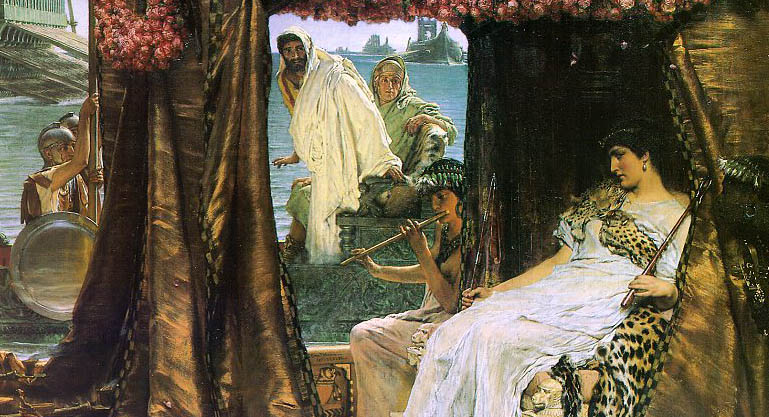Believed to have been first performed around 1607, this play immortalizes one of history's most famous and captivating love stories...that of Roman general Mark Antony and Cleopatra, Pharaoh of Egypt. It is a story of passion, betrayal, power, and ambition. But more than the relationship of two people is at stake as two empires collide and the fate of the world hangs in the balance.
The Plot:
Mark Antony is one of the triumvirs of the Roman Republic, but lately he has been neglecting his duties. He has fallen in love with Cleopatra and spends his time with her in Egypt. He ignores Rome's problems, even when his own wife dies after leading a rebellion against Octavius Caesar. Tensions mount between Antony and Caesar when Antony is called back to Rome to help fight pirates who are terrorizing the Mediterranean. In an effort to smooth things over and strengthen the bond between the co-rulers, newly widowed Antony marries Caesar's sister, Octavia.
Eventually, Antony is unable to resist returning to Cleopatra. He abandons his family and has himself and Cleopatra crowned as King and Queen of the eastern third of the Roman Empire. War is inevitable and both sides prepare for a meeting that will change not only of their own lives, but that of the empire as well.
My Review (Caution - Spoilers):
I wasn't sure what to expect from this particular play, but I ended up enjoying it quite a bit. It was, in my opinion, the most complex of the Shakespeare plays that I have read. I enjoyed the Roman setting, and the similarities to the power struggle seen in Macbeth was interesting as well.
The play is structured around the dichotomy of Rome and Egypt. Rome is portrayed as an almost masculine empire. It is ruled by men and governed by law and reason. Honor and strength in battle is considered more important than anything. Egypt, ruled be a woman, is portrayed as a land of pleasure and sensuality. Emotion dictates action. In this world, there is no room for emotion and reason to coexist. Antony is weak because he allows his desire for Cleopatra to keep him from fulfilling his duties to Rome and to his family. Though it is line with 17th century thinking, it could certainly rub modern audiances the wrong way.
The role of Cleopatra is considered by many one of Shakespeare's most complex female roles. At first glance, she seems to embody the manipulative seductress. She is given to hysterics, uses her changing moods to keep Antony with her, and rules a court given completely to pleasure and sensuality. And yet, underneath all of that, she is also a skilled ruler. She shows time and again that she does not use her feminine whiles for selfish pleasure only. She is Julius Caesar's mistress while he is in power. She saves her Egyptian fleet at the price of Antony's. She considers Octavius Caesar's offer of allowing her to keep Egypt in exchange for killing Antony. And she takes her own life, not in grief for Antony, but rather in fear that she will be taken to Rome as a prize. It is clear that she is not a character to be put in a box.
This was a nice way to finish my summer reading of Shakespeare. It is certainly not as cut and dry of a play as it may appear at first glance. And in many ways, it combines elements of all of the Shakespearean categories...comedy, history, and tragedy. A good read for anyone who loves Roman history and complicated characters.
The Performance:
Though
reading Shakespeare is fun, it is also important to see it performed.
Shakespeare gives few stage directions and this allows each individual
give their own interpretation of the characters an their actions.
I watched the 1974 television performance by the Royal Shakespeare Company. It stars Richard Johnson, Janet Suzman, Corin Redgrave, and Patrick Stewart. This is the RSC, so naturally it was well acted. Some of the production values screamed 1970s, but overall it was a good performance.
Do you have a favorite performance of this play? Share with us in the comments!

















1 comment:
I love this play, it's my favourite Shakespeare tragedy right after Macbeth. I really like the contrast between Rome and Egypt and whenever I read this I'm always pondering about what Charmian's character represents here.
Post a Comment